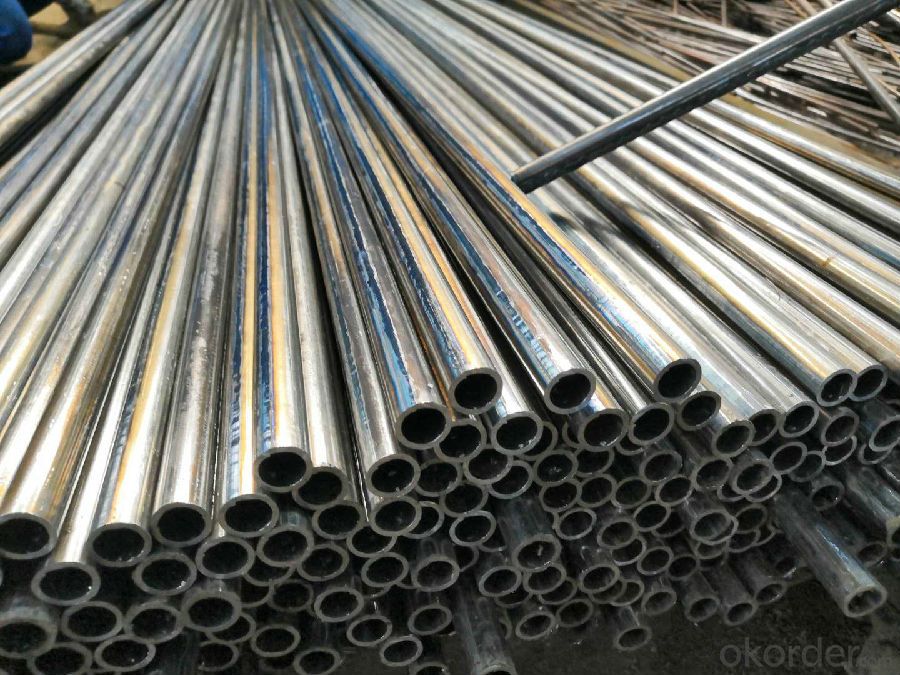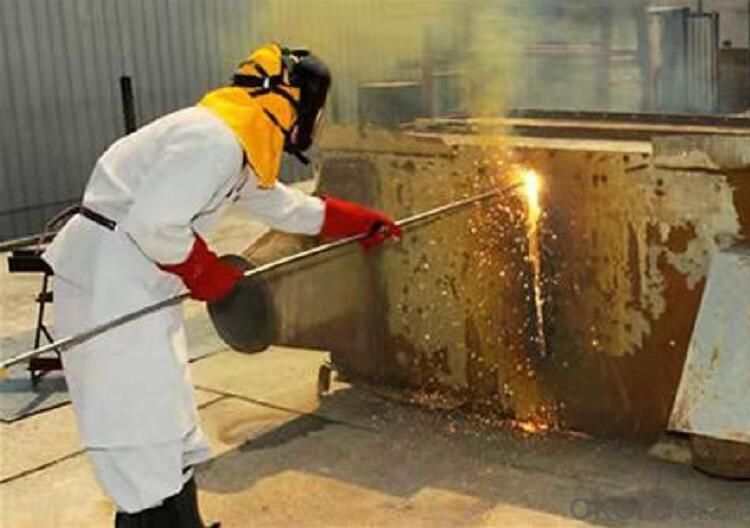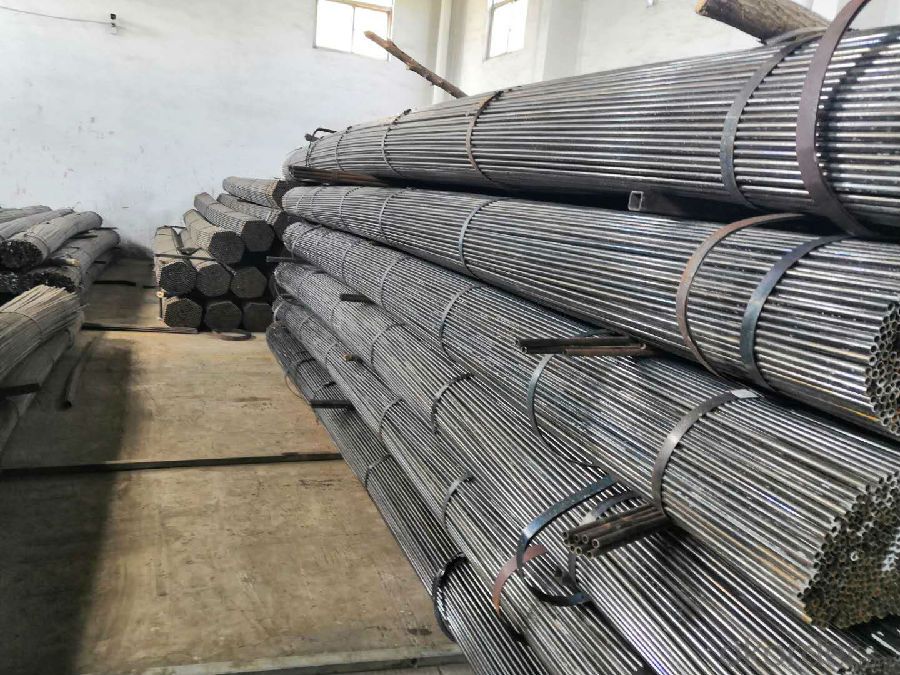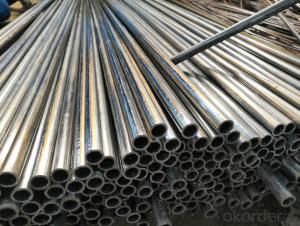Special steel smelting blowing oxygen tube
- Loading Port:
- Shanghai
- Payment Terms:
- TT OR LC
- Min Order Qty:
- 20 m.t
- Supply Capability:
- 800 m.t/month
OKorder Service Pledge
OKorder Financial Service
You Might Also Like
Item specifice
The oxygen blowing tube is a small-caliber steel pipe used for making steel and blowing oxygen. Generally, small-caliber welded steel pipes are used. The standard is from 3/8 inch -2 inch eight, with 08, 10, 15, 20 or Q195-Q235 steel belts. Made. In order to prevent erosion, some of them perform aluminizing treatment.
Features:
Decarbonization
Carbon and other chemicals give specific properties or properties to metals, so these chemicals should be carefully measured and controlled during smelting. Oxygen tubes are used in blast furnaces, converters, induction furnaces, and arc furnaces to make steel carbon, that is, oxygen rich mixtures are injected into metal melt through blow tubes. The oxidation reaction burns the excess carbon in the metal melt, reducing its carbon composition to a suitable standard.
 Iron mouth
Iron mouth
When the expected steel water composition and temperature are reached, the iron mouth is opened by means of a blow tube through drilling and tapping. One end of the oxygen blowing tube is connected to hyperbaric oxygen, and the end of the oxygen blowing tube is ignited. Through careful and skilled operation, the iron cannon mud with a thickness of 800 mm can be burned, which helps the flow out of the metal melt.
Clean the steel pack.
After the casting process is over, the steel package blocks need to be cleaned immediately. The slag on the package needs to be cleaned up. The blow tube is used to clean up and down the pipe mouth, such as the embedded slag at the bottom of the steel package, and also needs to be cleaned with a blow tube.
Clear the middle water outlet.
The intermediate package is a container that temporarily stores metal melt during the steelmaking process. It is more economical to replace the entire water filling system by cleaning the intermediate filling port with a blowing tube.
 Clean up the skin.
Clean up the skin.
The oxygen blowing tube can effectively cut and clean the slag skin caused by the slag layer. The solidified or solidified metal forms an insulating layer from the refractory material, reduces heat loss, and protects the lining from corrosion, chemical erosion, and thermal impact.
Clear steel spillage
The blowing tube is used to divide the solidified steel spillage into small parts that are easy to treat and to facilitate the remelting or treatment of some valuable spillage.
Where to sell Q235 blowing oxygen pipes, Q235 blowing oxygen tubes spot price, blowing oxygen tubes are used for steel blowing oxygen pipes, generally used welding steel pipes, specifications from 3/8 inches -2 inches eight. Made of 08, 10, 15, 20 or Q195-Q235 steel belts. In order to prevent erosion, some of them perform aluminizing treatment.
Specification: 5m-16m
5 * 1, 5 * 1.5, 6 * 1, 6 * 1.2, 6 * 1.5, 8 * 1, 8 * 1.2, 8 * 1.5, 9.52 * 1.24, 10 * 1, 10 * 1.2, 10 * 1.5, 10 * 1.8, 10 * 2, 10.5 * 2.5, 12 * 1, 12 * 1.2, 12 * 1.5, 12 * 1.8, 12 * 2, 13 * 1, 13 * 1.2, 13 * 1.5, 13 * 2, 14 * 1, 14 * 1.2, 14 * 1.5, 14 * 2, 16 * 1, 16 * 1.2, 16 * 1.3, 16 * 1.4, 16 * 1.5, 16 * 2, 17 * 2, 18 * 2, 19 * 2, 20 * 2, 21 * 2, 22 * 2, 27 * 2, 38 * 11, etc., and can produce special specifications of blowing tubes, coating blowing tubes, seamless blowing oxygen Guandeng.
Oxygen Pipe Co., Ltd. and Japan's Sumitomo Metals, Kawasaki Iron, New Japan Iron Kobe Steel, Germany's Waluruike, Bentele, and Spain's T.R and Tvbesex, Italy Dalming and other world-renowned steel pipe production companies have a good cooperative relationship, It is a Japanese JFE company's spot supplier in the Chinese market. At the same time, the company and Tianjin seamless, Baosteel steel pipe, Hengyang steel pipe, Baotou steel pipe, Chengde steel pipe and other domestic large-scale steel pipe manufacturers have established a good cooperative relationship. It is now the agent of high pressure alloy tube Tianjin, Chengdu Iron and Steel Co., Ltd.. Through several years of hard work, the company has become a large scale alloy steel pipes, steel pipes for structure, welding pipes, Square moment tubes, heterogeneous tubes, copper pipes and steel materials production and sales base. At the same time, the company has sold seamless pipes, alloy tubes, welding pipes, galvanized tubes, heterogeneous tubes, and Guandeng products from major domestic steel mills to all parts of the world. The products are exported to South, North America, Australia, Africa, Europe and the Middle East. The country is well received by domestic and foreign customers.
 Our company's main products are: purple copper pipe also known as copper pipe. Nonferrous metal tube. It's a pressed and pulled seamless tube. Light weight, good thermal conductivity, high low temperature strength. Commonly used in the manufacture of heat transfer equipment(such as condensers, etc.). It is also used to assemble low-temperature pipelines in oxygen production equipment. Small diameter copper tubes are often used to transport pressure liquids(such as lubrication systems, hydraulic systems, etc.) and pressure measurements used as instruments. Copper pipes have strong, corrosion-resistant characteristics and become the first choice for modern contractors to install tap water pipes, supply pipes, and refrigeration pipes in all residential commercial houses. Heterotype tube tubes can be divided into elliptical heterotype steel pipes, triangular heterotype steel pipes, hexagonal heterotype steel pipes, diamond-shaped heterotype steel pipes, octagonal heterotype steel pipes, and semicircular heterotype steel circles. Unequal hexagonal heterotype steel pipes, five-plum-shaped heterotype steel pipes, double-convex heterotype steel pipes, double-concave heterotypic steel pipes, melon son heterotypic steel pipes, conical heterotypic steel pipes, and wavy heterotypic steel pipes. Heterotype tube, heterotype tube, moment type tube, heterotype welded tube, spiral welded tube, specification: 20 * 20mm -500mm, wall thickness 0.6mm -20mm, spiral steel pipe. Spiral steel pipe specification, 219mm -2020mm, Wall thickness 5mm -20mm. Straight seam specifications are 4 minutes, 6 minutes, 1 inch, 1.2 inches, 1.5 inches, 2 inches, 2.5 inches, 3 inches, 4 inches, 5 inches, 6 inches, 8 inches, 102, 108, 127, 133, 139, 159, 168, 177, 194, 219 Heterotype tubes such as 273 and 325 generally refer to rectangular steel pipes. Casting special oxygen blowing tubes, referred to as oxygen melting rods, oxygen melting rods, also known as oxygen blowing rods and oxygen arc melting rods, are the first products of Shanghai Baosteel to have rapid melting and cleaning functions. As long as it is fuelled by oxygen, it can immediately produce a high temperature of 3,600 degrees, allowing the processed workpieces(metal, non-metal, concrete, rock) to be quickly melted or cleaned to achieve the purpose of the operation. Also produced seamless steel pipes, stainless steel pipes, composite pipes, galvanized Guanji other pipes, high quality prices. The products are sold throughout the country and exported to more than a dozen countries and regions such as Southeast Asia, the Middle East, Europe and the United States, and enjoy high honors in domestic and foreign markets.
Our company's main products are: purple copper pipe also known as copper pipe. Nonferrous metal tube. It's a pressed and pulled seamless tube. Light weight, good thermal conductivity, high low temperature strength. Commonly used in the manufacture of heat transfer equipment(such as condensers, etc.). It is also used to assemble low-temperature pipelines in oxygen production equipment. Small diameter copper tubes are often used to transport pressure liquids(such as lubrication systems, hydraulic systems, etc.) and pressure measurements used as instruments. Copper pipes have strong, corrosion-resistant characteristics and become the first choice for modern contractors to install tap water pipes, supply pipes, and refrigeration pipes in all residential commercial houses. Heterotype tube tubes can be divided into elliptical heterotype steel pipes, triangular heterotype steel pipes, hexagonal heterotype steel pipes, diamond-shaped heterotype steel pipes, octagonal heterotype steel pipes, and semicircular heterotype steel circles. Unequal hexagonal heterotype steel pipes, five-plum-shaped heterotype steel pipes, double-convex heterotype steel pipes, double-concave heterotypic steel pipes, melon son heterotypic steel pipes, conical heterotypic steel pipes, and wavy heterotypic steel pipes. Heterotype tube, heterotype tube, moment type tube, heterotype welded tube, spiral welded tube, specification: 20 * 20mm -500mm, wall thickness 0.6mm -20mm, spiral steel pipe. Spiral steel pipe specification, 219mm -2020mm, Wall thickness 5mm -20mm. Straight seam specifications are 4 minutes, 6 minutes, 1 inch, 1.2 inches, 1.5 inches, 2 inches, 2.5 inches, 3 inches, 4 inches, 5 inches, 6 inches, 8 inches, 102, 108, 127, 133, 139, 159, 168, 177, 194, 219 Heterotype tubes such as 273 and 325 generally refer to rectangular steel pipes. Casting special oxygen blowing tubes, referred to as oxygen melting rods, oxygen melting rods, also known as oxygen blowing rods and oxygen arc melting rods, are the first products of Shanghai Baosteel to have rapid melting and cleaning functions. As long as it is fuelled by oxygen, it can immediately produce a high temperature of 3,600 degrees, allowing the processed workpieces(metal, non-metal, concrete, rock) to be quickly melted or cleaned to achieve the purpose of the operation. Also produced seamless steel pipes, stainless steel pipes, composite pipes, galvanized Guanji other pipes, high quality prices. The products are sold throughout the country and exported to more than a dozen countries and regions such as Southeast Asia, the Middle East, Europe and the United States, and enjoy high honors in domestic and foreign markets.
Our company is strong, adopt and spot combination of business model. We have thousands of tons of stock in stock, sufficient supply, complete specifications and prompt delivery. Established a perfect purchasing → selling → transportation integrated supply and marketing service network.
At the same time, our company is a designated company of PetroChina and Sinopec, which has special equipment licenses and classification society certification. Our company solemnly promises to you: guarantee the best quality, the lowest price, the most perfect after-sales service to thank new and old customers.
- Q:What is the purpose of galvanizing steel pipes?
- The purpose of galvanizing steel pipes is to provide corrosion resistance and extend their lifespan.
- Q:How are steel pipes used in the construction of water supply systems?
- Steel pipes are commonly used in the construction of water supply systems due to their durability, strength, and resistance to corrosion. These pipes are used to transport water from the source to various points of distribution, such as buildings, homes, and industries. Steel pipes are often buried underground or installed above ground, depending on the specific requirements of the project. Additionally, steel pipes can withstand high pressure and are suitable for carrying large volumes of water, making them a reliable choice for water supply systems.
- Q:How do you remove rust from steel pipes?
- One effective way to remove rust from steel pipes is to use a wire brush or steel wool to scrub the affected areas. You can also apply a rust dissolver or a mixture of lemon juice and salt on the rusted spots and let it sit for a few hours before scrubbing. Additionally, using a commercial rust remover or a vinegar solution can also help in removing rust from steel pipes.
- Q:Can steel pipes be used for underground irrigation systems?
- Certainly, underground irrigation systems can indeed utilize steel pipes. Steel pipes have gained popularity for irrigation systems owing to their exceptional durability, strength, and corrosion resistance. They have the capability to endure the immense pressure and stress associated with being buried underground, thus ensuring longevity without the need for frequent maintenance or replacement. Moreover, the smooth interior surface of steel pipes enables efficient water flow and minimizes the risk of clogging. Additionally, steel pipes are readily available in a variety of sizes and can be easily customized to meet specific requirements of irrigation systems. However, it is crucial to ensure that the steel pipes employed for underground irrigation systems are adequately coated or treated to prevent corrosion and extend their lifespan.
- Q:How are steel pipes used in the manufacturing of appliances?
- Steel pipes are commonly used in the manufacturing of appliances as they provide a durable and reliable solution for various applications. They are used for carrying fluids, gases, and even electrical wiring within appliances due to their high strength and resistance to corrosion. Additionally, steel pipes are also utilized for structural support and framing, ensuring the stability and longevity of appliances.
- Q:What are the properties of steel that make it suitable for pipe manufacturing?
- Steel is a highly preferred material for pipe manufacturing due to its unique properties. Firstly, steel exhibits exceptional strength and durability, making it capable of withstanding high pressure and extreme temperatures. This strength ensures that steel pipes can safely transport fluids and gases over long distances without the risk of leakage or breakage. Another important property of steel is its resistance to corrosion. Steel pipes are often exposed to various corrosive substances such as water, chemicals, and gases, which can degrade other materials over time. However, steel is highly resistant to corrosion, resulting in long-lasting and reliable pipes. Additionally, steel is a highly versatile material, allowing for various pipe sizes and shapes to be manufactured. Steel pipes can be customized to meet specific project requirements, making them suitable for a wide range of applications such as water supply, oil and gas transmission, sewage systems, and structural support. Moreover, steel is known for its excellent thermal conductivity, which is crucial for applications involving the transportation of hot or cold fluids. Steel pipes efficiently transfer heat, ensuring minimal energy loss during the process. Furthermore, steel is a recyclable material, making it an environmentally friendly option for pipe manufacturing. Steel pipes can be recycled and reused, reducing the need for new raw materials and minimizing waste generation. In conclusion, the properties of strength, durability, corrosion resistance, versatility, thermal conductivity, and recyclability make steel an ideal choice for pipe manufacturing. These properties ensure the reliability, efficiency, and longevity of steel pipes in various industries and applications.
- Q:What is the difference between internal and external coating for steel pipes?
- A protective layer is applied to the inner surface of steel pipes, which is known as internal coating. The main purpose of this coating is to prevent corrosion and enhance resistance against chemicals present in the fluid being transported. Techniques like spraying, brushing, or dipping are commonly used to apply the internal coating, and it can be made of materials such as epoxy, polyurethane, or cement mortar. On the contrary, external coating involves the application of a protective layer on the outer surface of steel pipes. The main objective of this coating is to protect against environmental factors like corrosion, abrasion, and impact. External coatings are usually applied through methods like wrapping or coating with materials such as polyethylene, fusion-bonded epoxy, or asphalt enamel. To summarize, the primary difference between internal and external coating for steel pipes lies in their location and purpose. Internal coatings safeguard the inner surface from corrosion and chemical attacks, while external coatings provide protection against environmental damage on the outer surface. Both types of coatings are essential to ensure the durability and reliability of steel pipes in various applications.
- Q:What are the advantages of using stainless steel pipes?
- There are several advantages of using stainless steel pipes. Firstly, stainless steel pipes have excellent corrosion resistance, making them suitable for a wide range of applications, including industrial, commercial, and residential plumbing systems. They can withstand harsh environments, chemicals, and high temperatures without deteriorating or rusting. Secondly, stainless steel pipes have high strength and durability, ensuring long-term reliability and reducing the need for frequent repairs or replacements. They can handle high pressure and stress, making them suitable for transporting fluids and gases in various industries. Additionally, stainless steel pipes are hygienic and easy to clean, making them ideal for applications in the food, beverage, and pharmaceutical industries. They are resistant to bacterial growth and contamination, ensuring the integrity and safety of the transported materials. Furthermore, stainless steel pipes are aesthetically pleasing and can be easily customized to fit different design requirements. They offer a sleek and modern appearance, making them suitable for architectural and decorative purposes. Overall, the advantages of using stainless steel pipes include corrosion resistance, durability, strength, hygiene, and aesthetic appeal, making them a reliable and versatile choice for various industries and applications.
- Q:What are the common applications of steel pipes in construction?
- Steel pipes are commonly used in construction for various applications such as structural support, plumbing, water distribution, gas transportation, and HVAC systems. They provide strength, durability, and resistance to corrosion, making them an ideal choice for these purposes.
- Q:Are steel pipes suitable for industrial cooling systems?
- Yes, steel pipes are suitable for industrial cooling systems. They are highly durable, resistant to corrosion, and can withstand high pressures and temperatures. Additionally, steel pipes have excellent heat transfer properties, making them efficient for cooling applications.
1. Manufacturer Overview |
|
|---|---|
| Location | |
| Year Established | |
| Annual Output Value | |
| Main Markets | |
| Company Certifications | |
2. Manufacturer Certificates |
|
|---|---|
| a) Certification Name | |
| Range | |
| Reference | |
| Validity Period | |
3. Manufacturer Capability |
|
|---|---|
| a)Trade Capacity | |
| Nearest Port | |
| Export Percentage | |
| No.of Employees in Trade Department | |
| Language Spoken: | |
| b)Factory Information | |
| Factory Size: | |
| No. of Production Lines | |
| Contract Manufacturing | |
| Product Price Range | |
Send your message to us
Special steel smelting blowing oxygen tube
- Loading Port:
- Shanghai
- Payment Terms:
- TT OR LC
- Min Order Qty:
- 20 m.t
- Supply Capability:
- 800 m.t/month
OKorder Service Pledge
OKorder Financial Service
Similar products
New products
Hot products
Related keywords
































